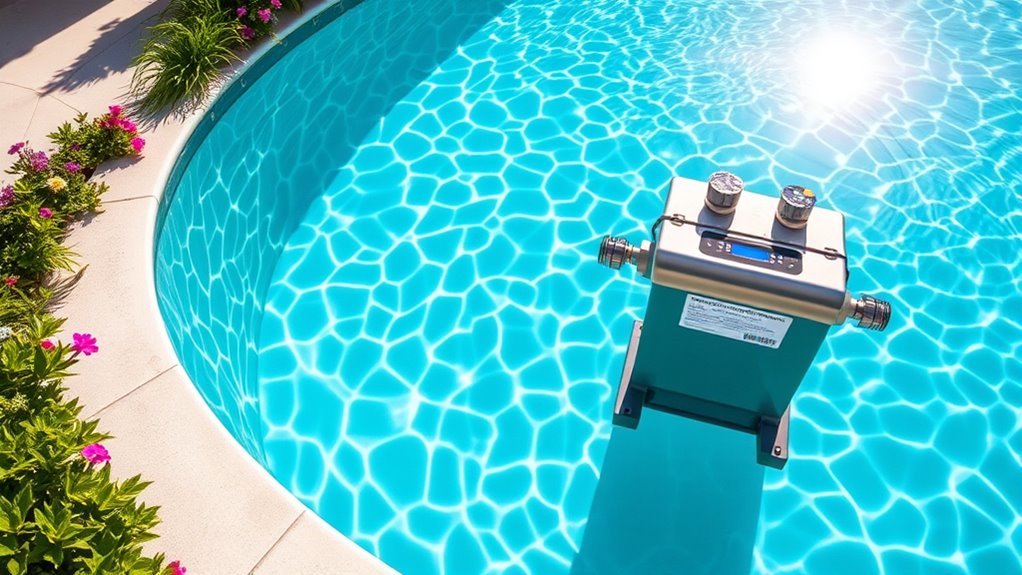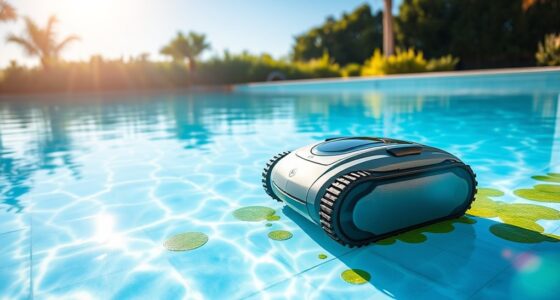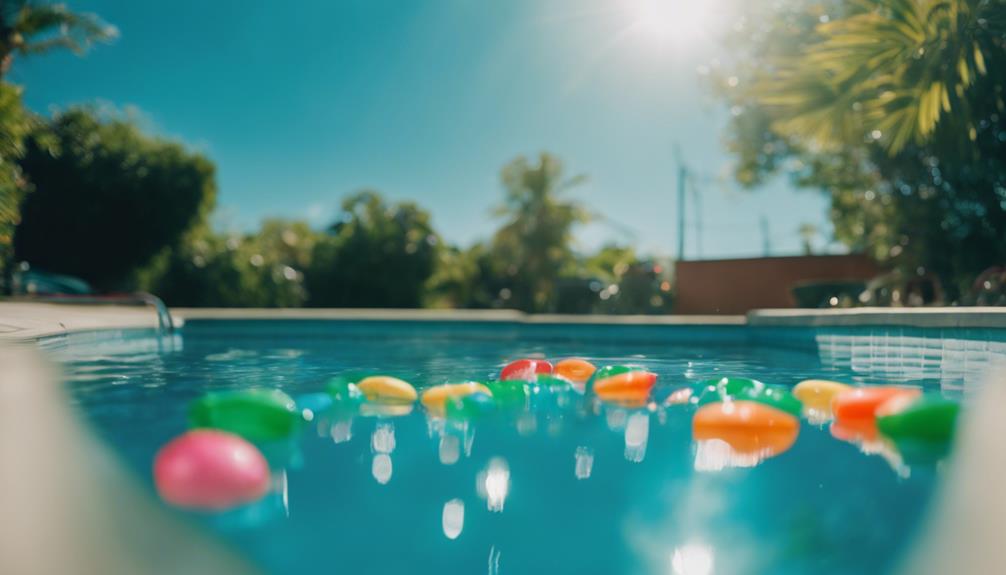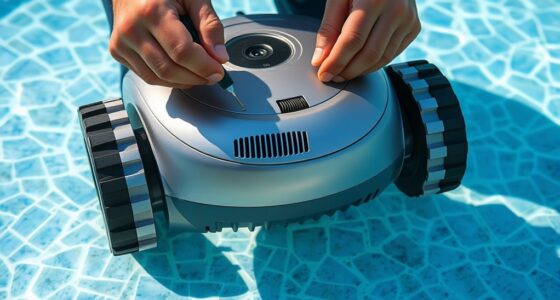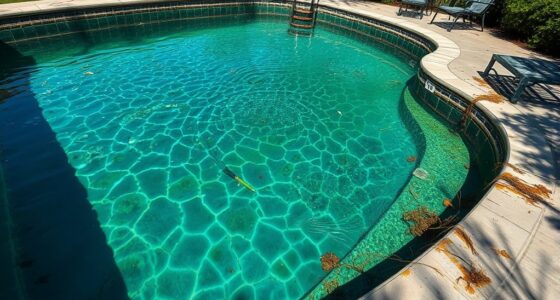Switching to a saltwater pool means you’ll enjoy a softer, more natural feel and easier maintenance since the salt cell produces chlorine automatically. However, to keep your pool clean and safe, you need to regularly check and balance the salt levels, water chemistry, and monitor your salt cell for buildup or issues. Proper upkeep guarantees smooth operation and longevity. If you’re curious about the best tips and tricks, there’s more to uncover to keep your pool pristine.
Key Takeaways
- Regularly monitor and maintain salt levels within the recommended range for optimal chlorine production.
- Clean and inspect the salt cell regularly to prevent mineral buildup and ensure efficient operation.
- Balance water chemistry, including pH, alkalinity, and calcium hardness, to prevent scaling or corrosion.
- Understand that switching to saltwater simplifies chemical management but still requires consistent maintenance.
- Address any salt cell or water chemistry issues promptly to avoid cloudy water, algae, or equipment damage.
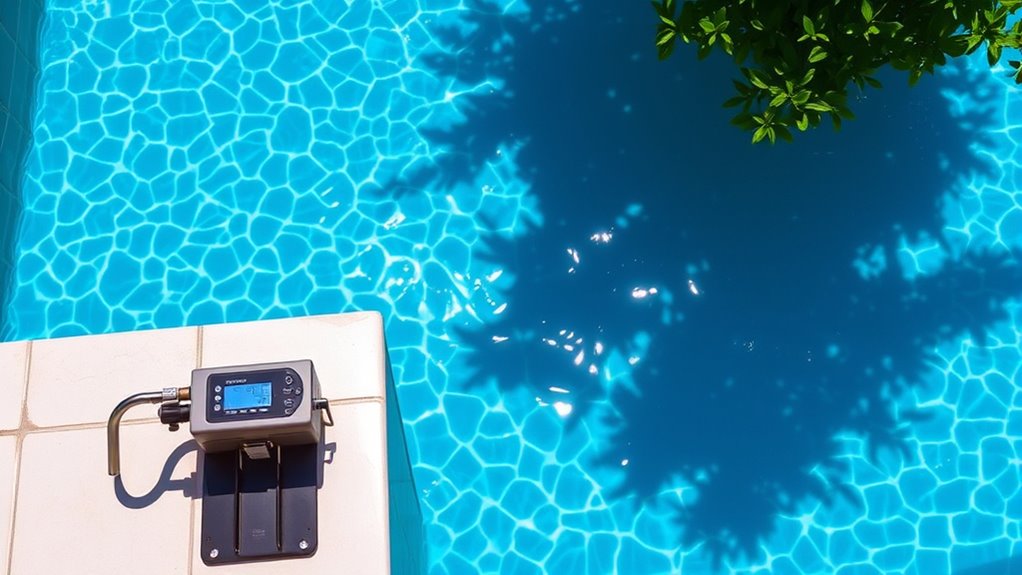
Maintaining a saltwater pool requires a different approach than traditional chlorinated pools, but with the right routine, you can keep your water clean and inviting. One of the main benefits of switching to saltwater is that it offers a more natural, softer feel compared to harsh chlorine. However, understanding how to manage your system effectively is key to enjoying all these benefits. When exploring chlorine alternatives, many pool owners opt for saltwater systems because they produce a steady, low level of sanitizer through the salt cell. This means less manual addition of chemicals and a more consistent water quality. Still, saltwater pools aren’t maintenance-free. You’ll need to monitor your salt levels regularly, ensuring they stay within the ideal range for your salt cell to produce chlorine efficiently.
Salt cell troubleshooting is an essential part of maintaining a healthy saltwater pool. If you notice your water isn’t as clear as it should be, or if the sanitizer levels are dropping unexpectedly, the salt cell might be the culprit. Common issues include mineral buildup or corrosion, which can interfere with its function. Regularly inspecting your salt cell, cleaning it according to manufacturer instructions, and replacing it when necessary will keep your system running smoothly. Many pool owners forget that, despite the name, saltwater pools still require some chlorine to keep bacteria and algae at bay, so staying on top of salt cell maintenance is crucial. Additionally, self watering plant pots often incorporate features that help maintain consistent moisture, similar to how saltwater pools require regular monitoring to keep water chemistry balanced.
Balancing your water chemistry is another critical aspect. Unlike traditional pools that rely heavily on chlorine tablets or liquid chlorines, saltwater pools depend on the electrolysis process within the salt cell. This means that pH, alkalinity, and calcium hardness levels need to be carefully maintained to prevent scale buildup or corrosion. Properly calibrated test kits will help you keep these levels in check, reducing the risk of damage and prolonging the lifespan of your salt cell. When your salt cell isn’t functioning properly, it can lead to uneven sanitation, causing cloudy water or algae growth. Addressing salt cell troubleshooting issues promptly ensures your pool stays safe, clean, and enjoyable.
Frequently Asked Questions
How Often Should I Test Salt Levels in My Pool?
You should test your salt levels at least once a month to monitor salinity fluctuations and make certain of proper pool chemistry. Use reliable testing methods like digital testers or test strips for accuracy. Regular testing helps prevent problems like corrosion or algae growth caused by imbalanced salinity. If you notice any changes in water feel or clarity, test more frequently. Consistent checks keep your saltwater pool comfortable and well-maintained.
Can Saltwater Pools Cause Corrosion to Pool Equipment?
Imagine gentle waves softly caressing your pool’s equipment—while saltwater pools generally pose low corrosion risks, they can still challenge equipment durability over time. You might notice minor wear if salt levels aren’t properly maintained. Regular testing and maintenance minimize corrosion risks, helping your equipment stay strong. With proper care, your saltwater pool remains a soothing oasis without compromising equipment longevity, ensuring your backyard remains both beautiful and durable.
What Is the Ideal Ph Level for a Saltwater Pool?
You should aim for a pH level between 7.4 and 7.6 in your saltwater pool. Maintaining this range helps guarantee ideal chlorine generation and makes salt cell maintenance easier. When the pH is balanced, your pool’s water stays clear, and equipment runs smoothly. Regular testing and adjustments prevent corrosion issues and keep your saltwater system functioning efficiently, providing you with clean, safe swimming water.
Are Saltwater Pools More Expensive to Maintain Than Traditional Pools?
You might find saltwater pools slightly more expensive to maintain initially due to equipment costs, but they often save you money long-term. The cost comparison favors saltwater pools because their equipment, like salt chlorinators, tends to last longer and requires less chemical upkeep. Plus, you’ll spend less on purchasing and handling harsh chemicals, making saltwater pools a more cost-effective option over time.
How Do I Winterize My Saltwater Pool Properly?
Imagine your pool as a sleeping giant, resting through winter’s chill. To winterize your saltwater pool, you’ll want to first secure a sturdy pool cover, guarding it like a shield. Then, add winter chemicals to prevent algae growth and corrosion. Drain some water if needed, and guarantee all equipment is properly stored. These steps help protect your pool’s health, ensuring it’s ready to awaken when spring arrives.
Conclusion
Switching to a saltwater pool is like tending a delicate garden—you’ll need regular care and attention to keep it thriving. With proper maintenance, your pool becomes a soothing oasis, gentle on your skin and easier to enjoy. Remember, consistency is your best tool; neglect it, and the beauty may fade. Embrace the process, and your saltwater pool will reward you with crystal-clear waters and endless summer relaxation.

